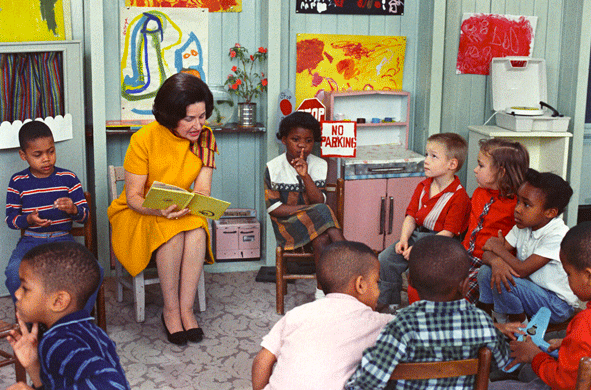Parents, Head Start Providers Challenge New Rule Barring Undocumented Families
ACLU argues Trump administration can’t unilaterally change Head Start’s definition from an early education to a federal public benefit program.

Join our zero2eight Substack community for more discussion about the latest news in early care and education. Sign up now.
A coalition of parents and Head Start providers moved to update their lawsuit against the Trump administration Tuesday in response to a drastic federal policy shift that bars many immigrant families from the early education centers.
The new rule was announced July 10 and published in the Federal Register Monday by the U.S. Department of Health & Human Services, which oversees Head Start. Some immigrants, including refugees and those with a green card, would remain eligible to access Head Start services, but scores of others, including undocumented residents, DACA recipients and those with Temporary Protected Status or student visas, would not. Those on so-called U visas, typically survivors of domestic violence, drug trafficking or other serious crimes, would also no longer be eligible.
An estimated 115,000 Head Start children and families could be impacted, about 16% of the program’s total 2024 enrollment, according to an HHS analysis.
“It’s incredibly inhumane what they’re doing,” said Joel Ryan, executive director of the Washington State Association of Head Start, “and it’s much more far reaching than undocumented people — not just because there are other populations [included], but it has a real chilling effect … it’ll scare a lot of people that might have mixed status, or they may be perfectly legal, but they’re afraid.”

It’s not yet clear how the new restrictions would be implemented or tracked, and some lawyers and local Head Start leaders are encouraging providers to hold off on any changes until there is more clarity around their legal obligations. This is a particularly tricky moment to introduce such a radical change, experts noted, as many providers are currently recruiting students for the fall.
The new rule was enacted by rescinding a 1998 Clinton administration interpretation of the Personal Responsibility and Work Opportunity Reconciliation Act of 1996. That interpretation extended some federal public benefits to undocumented immigrants, which the Trump administration now claims “undercut” the original law, was “improper” and “incentivize[d] illegal immigration.” The administration has embarked on an aggressive campaign to deport millions of undocumented residents, including by targeting students and attempting to end birthright citizenship.
The updated policy redefines Head Start as a “federal public benefit,” and in doing so, restricts access to early childhood education based on immigration status.
“This new rule is not only unprecedented in the program’s history, but it’s also completely at odds with the mandate for Head Start to provide early education to low-income children and their families,” said Linda Morris, an ACLU senior staff attorney and co-counsel on the lawsuit.
The administration’s stated goal is to, “restore compliance with federal law and ensure that taxpayer-funded program benefits intended for the American people are not diverted to subsidize illegal aliens,” according to an HHS press release. Head Start is explicitly named as one of the impacted programs “to ensure enrollment … is reserved for American citizens from now on.”
At least 12 other federally funded programs are included in the new rule, such as the Community Mental Health Services Block Grant and the Projects for Assistance in Transition from Homelessness Grant Program, which provides funds for people with serious mental illness experiencing homelessness.

The department’s announcement comes after months of layoffs, funding freezes and uncertainty for Head Start, which has reached more than 38 million children and their families, the majority of them low income, since its inception in the 1960s. In 2023, the $12 billion program served over 778,000 children from birth to age 5 and pregnant mothers and their families in urban, suburban and rural areas in all 50 states and six territories.
Along with providing early education and resources to kids, Head Start also connects families to community and federal assistance and can help provide a career pathway for parents. The 1,600 local agencies are funded by the federal government, though many also tap into state and local revenue sources.
The program has long been a target of the right, and the conservative playbook Project 2025 has called for its full elimination, arguing Head Start has “little or no long-term academic value for children.”
HHS estimates the new rule could lead to an increase of $374 million in services for American citizens, but that does not account for the cost to families losing services or to the broader economy as working parents lose access to child care, said the ACLU’s Morris.
“It’s important to remember that this new rule is not just an attack on immigrant communities. It’s also an attack on working families,” she added. “The social and economic impacts of this new rule will be felt beyond these families — it will be felt across communities, and really across the nation.”
In May, a coalition of parents and Head Start providers, represented by the ACLU Women’s Rights Project, the ACLU of Washington, ACLU of Illinois, the Impact Fund and others, filed a lawsuit in Washington state against the Trump administration. The plaintiffs alleged the federal government was seeking to illegally dismantle the Head Start program by shuttering half of the organization’s regional offices; laying off scores of staff; and implementing “sweeping and impermissibly vague bans on activities that promote or advance ‘diversity,’ ‘equity,’ ‘inclusion,’ and/or ‘accessibility.’”
In this updated application, they also argue that expanding the definition of “federal public benefit” to include Head Start is an illegal attempt to rewrite statutory law, which violates the Administrative Procedure Act as well as the U.S. Constitution. They are asking the court to prevent the administration from enforcing or implementing this new directive.
“No agency, including HHS, has ever defined early education as a federal public benefit,” Morris said. “This new rule from the administration is completely at odds with how the agency has interpreted Head Start programs [historically], and the administration hasn’t followed any of the processes that it needed to follow in order to implement a change of this kind.”
The rule will also lead to “waves of kids that are unprepared for school” entering the public school system, according to Ryan. HHS’s updated interpretation does not impact undocumented K-12 students’ access to a free, public education, which is protected by the 1982 Supreme Court case Plyler v. Doe, although that ruling has also become a target of the Trump administration.
“These claims all stand together,” Ryan said, referring to the original lawsuit and this latest legal pushback. “I really see it as a cumulative effort to destroy the Head Start program and to make lives harder for very low-income kids and families in the country.”
Get stories like these delivered straight to your inbox. Sign up for The 74 Newsletter


;)
